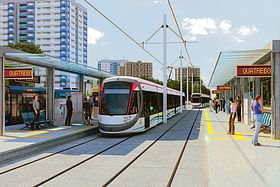The Uttar Pradesh Metro Rail Corporation (UPMRC) is planning to introduce metro services in tourist hotspots of Ayodhya, Varanasi and Mathura.
UPMRC MD Sushil Kumar in an interview with Hindustan outlined plans on constructing metro lines in religious tourism hotspots.
As per the plan, the services will be introduced as the ‘Metro lite’, which will be a miniature version of metro, covering limited parts of the city.
The Mass Rapid Transit System (MRTS) system at these places will not only reduce the traffic problem but also act as a catalyst in promoting tourism.
Plan Details
In Mathura, the Metro services will connect Vrindavan and Govardhan Parikrama Kshetra.
Similarly, in Varanasi, the proposed service will connect all the ghats and important institutions like Banaras Hindu University (BHU). The Uttar Pradesh government is also planning to bring water metro service to Varanasi on the lines of Kochi water metro.
With the grand Ram Janmabhoomi temple in Ayodhya likely to be opened by early 2024, it is expected that the temple town will see a deluge of religious pilgrims. The UPMRC is working to provide a swift connectivity to the temple and other major sites in the city.
Apart from this, the proposed metro lite service will also cover areas falling within Panch Kosi and Chaudah Kosi Parikrama Kshetra.
Followers of the Panch Kosi Parikrama take a holy bath in the water of Saryu River and then go to five destinations, each at distance of one kosh (~3 km) around the periphery of Ayodhya. Those places are Kardmeshwar, Shivpur, Rameshwar, Bhimchandi and Kapildhara.
Similarly, Chaudah Kosi Parikrama involves walking 42 km within the city.
Uttar Pradesh already has operational metro networks in Lucknow, Ghaziabad, Noida, Greater Noida and Kanpur. The state government is working on expanding the services to Agra, Gorakhpur, Meerut, Bareilly, Jhansi and Prayagraj.
Metro Lite
Cities with a well spread-out spatial pattern, even if they have a high population, may not have sufficient number of corridors with adequate density to justify investments in a metro.
As such state governments have been requested to adopt Metro Lite as a prime mode of mass transit in smaller cities.
This system which can be constructed at a cost of about 40 per cent of high-capacity metro system is more viable and sustainable due to less capital, operation and maintenance costs.
As of now, three Metro Lite Projects are under various stages of implementation. These include Gorakhpur in Uttar Pradesh and Jammu and Sri Nagar.


